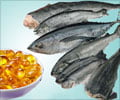Intaking diets rich in Omega-3 oils may reduce endometriosis risk in women, suggests a new study.
Intaking diets rich in Omega-3 oils may reduce endometriosis risk in women, suggests a new study. On the contrary women who consume diets heavily laden with trans fats more likely to suffer from infertility.
The study is the largest to have investigated the link between diet and endometriosis risk and the first prospective study to identify a modifiable risk factor for the condition.It found that while the total amount of fat in the diet did not matter, the type of fat did.
Women who ate the highest amount of long-chain Omega-3 fatty acids were 22 percent less likely to be diagnosed with endometriosis than those who ate the least and that those who ate the most trans fats had a 48 percent increased risk, compared with those who ate the least.
The findings from 70,709 American nurses followed for 12 years not only suggest that diet may be important in the development of endometriosis, but they also provide more evidence that a low fat diet is not necessarily the healthiest and further bolster the case for eliminating trans fats from the food supply, said the study's leader, Dr. Stacey Missmer.
"Millions of women worldwide suffer from endometriosis. Many women have been searching for something they can actually do for themselves, or their daughters, to reduce the risk of developing the disease, and these findings suggest that dietary changes may be something they can do. The results need to be confirmed by further research, but this study gives us a strong indication that we're on the right track in identifying food rich in Omega-3 oils as protective for endometriosis and trans fats as detrimental," she added.
Long-chain Omega-3 fatty acids are found mostly in oily fish. They have been linked to reduced heart disease risk.
Advertisement
"Women tend to go to the Internet in particular to look for something they can do. The majority of the dietary recommendations they find there are the ones prescribed for heart health, but until now, those had not been evaluated specifically for endometriosis. This gives them information that is more tailored and provides evidence for another disease where it is the type of fat in the diet, rather than the total amount, that is important," said Missmer.
Advertisement
The study has been published online in Europe's leading reproductive medicine journal Human Reproduction.
Source-ANI
SRM















